Carrie
 for bloody violence, disturbing images, language and some sexual content.
for bloody violence, disturbing images, language and some sexual content.
Reviewed by: Spencer Schumacher
CONTRIBUTOR
| Moral Rating: | Very Offensive |
| Moviemaking Quality: |
|
| Primary Audience: | Adults Teens |
| Genre: | Horror Thriller Drama Remake |
| Length: | 1 hr. 39 min. |
| Year of Release: | 2013 |
| USA Release: |
October 18, 2013 (wide—3,000+ theaters) DVD: January 14, 2014 |
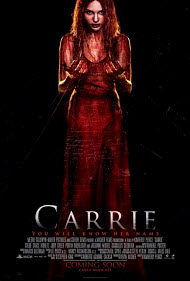

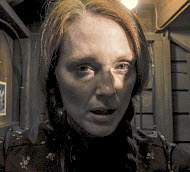
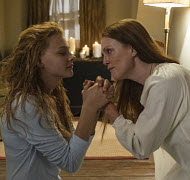
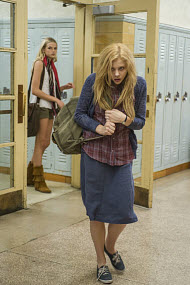
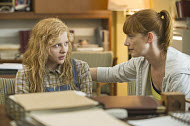
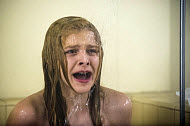
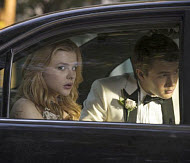
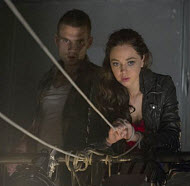

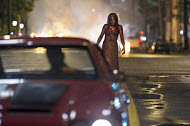
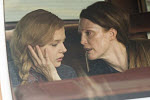
cruel bullying by teenagers
puberty / changes in a girl’s body
dangers of teen sex
SEXUAL LUST—What does the Bible say about it? Answer
PURITY—Should I save sex for marriage? Answer
My boyfriend wants to have sex. I don’t want to lose him. What should I do? Answer
How far is too far? What are the guidelines for dating relationships? Answer
religious fanaticism
mother daughter relationships
cruel mother
child abuse
revenge
paranormal phenomena, psychic power, telekinesis, supernatural power
FILM VIOLENCE—How does viewing violence in movies affect families? Answer
| Featuring |
|---|
|
Julianne Moore … Margaret White Chloë Grace Moretz … Carrie White Gabriella Wilde … Sue Snell Portia Doubleday … Chris Hargensen Zoë Belkin … Tina Samantha Weinstein … Heather Karissa Strain … Nicki Katie Strain … Lizzy Ansel Elgort … Tommy Ross Demetrius Joyette … George Judy Greer … Ms. Desjardin See all » |
| Director |
|
Kimberly Peirce |
| Producer |
|
Metro-Goldwyn-Mayer (MGM) Screen Gems See all » |
| Distributor |
Though only 16, the character of Carrie White is nearly 40 years old in fictional form (that’s 160 in mythology years). The origin of the story of a religiously oppressed teen that has her first period in a girls’ locker room and becomes the ridicule of the entire school dates back to 1974 when author Stephen King originally wrote the novel Carrie.
There have been previous cinematic versions of the Stephen King classic, the most prominent being the original 1976 Brian DePalma version starring Sissy Spacek in the titular role. A 2002 TV version was also made, as well as a less than favorable sequel (“The Rage: Carrie 2”). There is even a musical version of the story that played on Broadway.
Enter filmmaker Kimberly Pierece (“Boy’s Don’t Cry”, “Stop-Loss”) who states she wanted to reimagine the film as a superhero origin story of Carrie and her powers. The film in many ways does resemble more of an origin story than that of a horror film, or a supernatural thriller. There are elements of the supernatural and horror, but much of the plot focuses on the relationship between Carrie and her mother Margaret White (Julianne Moore) an overly protective, religious fanatic who shelters Carrie from any and all influence of the outside world. The relationship between Carrie and her domineering mother is very strained, and Carrie strives hard to be respectful, even obedient to her mother, but she is a teenager and is going through physical and emotional changes that she can’t explain and her mother has never told her about.
The changes start to dramatically occur as Carrie is showering after gym class and experiences her first menstrual cycle. Having not been forewarned about this inevitable moment in a young girl’s life, she naturally concludes she is bleeding to death and starts to panic, all to the amusement of her high school classmates, none of who consider Carrie to be their friend. This incident is captured on a cell phone (one of the modern technological updates that brings this adaptation into the 21st century, and makes it very timely). Carrie is laughed at, teased and becomes the focus of ridicule for the entire school. When the video is posted to a social media site it starts a chain of events that leads to a catastrophic conclusion.
Pierce is known for creating sympathetic outsiders who are just trying to fit in, but through no fault of their own end up being caught in a battle they did not start. For this latest version of a troubled outsider, Pierce cast Chloë Grace Moretz (“Let Me In,” “(500) Days of Summer”) in the title role. Moretz does a great job in inhabiting the role of this “deer trapped in the headlights” girl. She is very timid and walks around with self-doubt written all over her face, like a wounded animal or an abused dog. Though the film never shows Carrie being physically abused, there are definite signs of psychological abuse and neglect.
It should be noted that religion plays a prominent role in this story, in all incarnations of it. Carrie’s mom is what one might easily term a religious “zealot” or possibly a “fanatic”. She insists that Carrie not wear make up and dress very moderately. She does not allow her to participate in any extra curricular activities. When Carrie is invited to the prom, she is told by her mother that “they” are only doing it so “they will laugh at you.”
Though it is featured prominently, religion is never mocked or treated in a disparaging manner. One of the themes, throughout the film is forgiveness. Many characters have to face challenges of forgiveness for wrongs (or perceived wrongs) done to them. Carrie is struggling with forgiveness towards her mother. Prayer, and the notion that one should “pray” is also featured in the film. At first it is used as a device being forced upon Carrie by her mother in order for Carrie to atone for her sins, however later it is alluded to as Carrie is seen praying for her mother. Carrie also makes reference to a loving and forgiving God.
Of course, the other side of the forgiveness coin is vengeance, and revenge is a theme that also weighs heavy. This is where the discussion of this film becomes a little tricky. Anyone that has seen any version of the film, has read the novel, or even seen the posters (even on this site) knows that an iconic scene involving a LOT of blood weighs heavily on the story’s plot. If you don’t know the scene of which I speak, then I won’t spoil it here, just say it takes “bullying” to its ultimate extreme and sets into motion the tragic events of the films final act.
Those that are interested in how this film compares to the ‘76 classic should know that this is a solid update and stays remarkably close to the original version and even to the book. In some ways, particularly in the daughter/mother relationship, it can be argued that this film is better than the original. As mentioned, there are technological updates which make the film both timely and relevant. With the original film, the mother (played by Piper Laurie) is little more than a plot device to explain Carrie’s messed up life, with this update, Carrie’s relationship with her mother becomes the focus of the film. Once Carrie gets to the prom, and the 3rd act is set into motion, the films are very similar, save the enhancements of digital effects of this latest version.
As far as the offensiveness of this movie, it is rated “R” for bloody violence, disturbing images, language and some sexual content. The most prominent of those features being the “blood”, both literally and figuratively.
Blood is an overwhelming theme throughout the story, starting from the blood of Carrie’s birth to her public menstrual cycle to the iconic ending that many viewers will find disturbing. The movie (like the original) holds back most of its violence until its climax. There is a scene of self-mutilation as a woman scratches and cuts herself early on in the movie, a scene (at the beginning) where Carrie’s mom gives birth to Carrie on her own bed, and there’s quite a lot of blood on her gown and on the bed, but most of the bloodshed comes toward the end. There are scenes of people getting trampled, burned, impaled, crushed by bleachers, and killed in a rather gory car crash. A character is stabbed with a knife and another character is impaled/crucified by multiple sharp objects. There is also a scene involving the killing of a pig that, though not seen, is gruesomely suggestive.
Another topic that some viewers may find offensive is Carrie’s supernatural powers. Soon after her menstrual cycle, she discovers she has telekinetic abilities and slowly learns how to use them through the course of events that come upon her. There is also religious iconography that might disturb some viewers.
Besides the plot point of her menstrual cycle, there are scenes of women in little more than undergarments in the shower/locker rooms. Carrie is seen showering and washing her midriff and legs, though there is no actual nudity. Two teens are inside a van having sex, covered by a blanket. Their moans can be heard. There are conversations of past sexual encounters.
There are a handful of profane words used by Carrie’s classmates and gym teacher including the common variety of four letter epithets and “g*d’s”. Though there is profanity, none of it is uttered by Carrie and her mother, mostly because of their religious household.
If one is looking for a modern update of a classic film they may have seen as a child or enjoyed on a DVD/streaming device, then this latest version of “Carrie” will probably not disappoint. It offers a more compelling relationship between Carrie and her mother (as troubled as it may be) and updates it in a way that makes it relevant to today’s audience.
Though “religion” is prominent in the film, and a main character takes her “religion” to an abusive extreme, one’s faith is never attacked or disparaged. Carrie is painted as very sympathetic, rather than simply misunderstood.
Those who are not familiar with any versions of the material and do not go for horror movies or those of a supernatural nature, should probably stay clear of this latest version of “Carrie”. Some will find the rage fueled climax disturbing and difficult to take, images you may not want to remember and a name you’re not likely to forget.
Violence: Heavy / Profanity: Heavy—OMG (10), “G*d-d*mn” (4), “Jesus” (2), “God” (2), hell (2), damn, f-words (6), s-words (16), and various vulgar slang words / Sex/Nudity: Heavy
See list of Relevant Issues—questions-and-answers.


I would also like to say that even though I thought this movie was “meh,” there was one thing I liked about it. That even though Carrie has been through all this abuse she still says that she loves God. This isn’t a movie that just shows the typical crazy religious person that Hollywood loves to put in movies. It shows that despite the lies and hatred a person can be fed their whole life, a positive religious outlook is still possible.
Moral rating: Very Offensive / Moviemaking quality: 3
Whenever Carrie does something that is offensive to her mom or dishonorable (which every time, it is never dishonorable!), Her mother shoves Carrie into a closet and says that she “MUST REPENT AND ASK FOR FORGIVENESS!” In addition, one time in the movie, when Carrie was “dishonoring her mother,” her mother bangs her head against the wall, whenever Carrie tries to stop her mom from hurting herself, Carrie’s mom slaps Carrie with her Bible and knocks her over.
In the beginning of the movie, the Bible is in a puddle of water. Not only is the movie gory and vulgar, it also contains a sex scene. It also has some suggestive comments.
Overall, this movie is most definitely not meant for younger children, and this movie in my opinion disrespects my moral values and misuses the Bible. I wish I wouldn’t have watched this movie!!
Moral rating: Extremely Offensive / Moviemaking quality: 5
That said, that ridiculous plot was filmed very, very well, so I was still impressed with the quality overall. Julianne Moore stands out, her performance is positively horrifying. I thought it was creepier than Heath Ledger’s Joker. My friends thought I would be pleasantly surprised by the amount of positive content in this film, and they were right. But, as I have to say far too often, that doesn’t say much. See all »
Moral rating: Extremely Offensive / Moviemaking quality: 4
Moral rating: Offensive / Moviemaking quality: 4
Moral rating: Offensive / Moviemaking quality: 3
I wouldn’t advise anyone seeing this. It’s too dark and depressing, not something you would want in your heart and mind as a Christian.
This was not a recommended movie for anyone, let alone Christians.
Moral rating: Extremely Offensive / Moviemaking quality: no opinion
PLEASE share your observations and insights to be posted here.


My Ratings: Moral rating: Better than Average / Moviemaking quality: 4